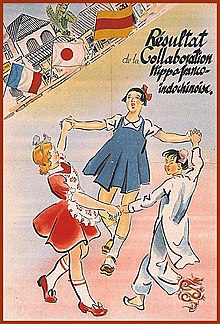
In mid-1940, Nazi Germany rapidly defeated the French Third Republic, and the colonial administration of French Indochina (modern-day Vietnam, Laos and Cambodia) passed to the French State (Vichy France). Many concessions were granted to the Empire of Japan, such as the use of ports, airfields, and railroads.[1] Japanese troops first entered parts of Indochina in September 1940, and by July 1941 Japan had extended its control over the whole of French Indochina. The United States, concerned by Japanese expansion, started putting embargoes on exports of steel and oil to Japan from July 1940. The desire to escape these embargoes and to become self-sufficient in resources ultimately contributed to Japan's decision to attack on December 7, 1941, the British Empire (in Hong Kong and Malaya) and simultaneously the United States (in the Philippines and at Pearl Harbor, Hawaii). This led to the United States declaring war against Japan on December 8, 1941. The United States then joined the side of the British Empire, at war with Germany since 1939, and its existing allies in the fight against the Axis powers.[2]
Indochinese communists had set up a covert headquarters in Cao Bằng Province in 1941, but most of the Vietnamese resistance to Japan, France, or both, including both communist and non-communist groups, remained based over the border, in China. As part of their opposition to Japanese expansion, the Chinese had fostered the formation of a Vietnamese nationalist resistance movement, the Dong Minh Hoi (DMH), in Nanking in 1935/1936; this included communists, but was not controlled by them. This did not provide the desired results, so the Chinese Communist Party sent Ho Chi Minh to Vietnam in 1941 to lead an underground centered on the communist Viet Minh. Ho was the senior Comintern agent in Southeast Asia,[3] and was in China as an advisor to the Chinese communist armed forces.[4] This mission was assisted by European intelligence agencies, and later the US Office of Strategic Services (OSS).[5] Free French intelligence also tried to affect developments in the Vichy-Japanese collaboration.
In March 1945, the Japanese imprisoned the French administrators and took direct control of Vietnam until the end of the war. At that point, Vietnamese nationalists under the Viet Minh banner took control in the August Revolution, and issued a Proclamation of Independence of the Democratic Republic of Vietnam, but France took back control of the country in 1945–1946.
In looking at the broad picture of Southeast Asia at the end of World War II, the different political philosophies of the major actors clashed, including:
- The anti-communist Western powers, which viewed the French as the protector of the area from communist expansion.
- The nationalist and anti-colonialist movements that wanted independence from the French.
- The communists, both local and foreign, who sought to expand their influence
The lines between these movements were not always clear, and some alliances were of convenience. Prior to his death in 1945, Franklin D. Roosevelt made several comments about not wanting the French to regain control of Indochina.[6]
- ^ Spector, Ronald H. (2007). In the ruins of empire : the Japanese surrender and the battle for postwar Asia (1st ed.). New York. p. 94. ISBN 9780375509155.
{{cite book}}: CS1 maint: location missing publisher (link) - ^ "World War II (1939-1945)". www2.gwu.edu. Retrieved 2017-05-30.
- ^ Tôn Thất Thiện (1990) Was Ho Chi Minh a Nationalist? Ho Chi Minh and the Comintern. Singapore: Information and Resource Centre. p. 39.
- ^ Quinn-Judge, Sophie (2002) Ho Chi Minh: The Missing Years 1919–1941. Berkeley and Los Angeles: University of California Press. p. 20
- ^ Patti, Archimedes L. A. (1980). Why Viet Nam? Prelude to America's Albatross. University of California Press. ISBN 0520041569., p. 477
- ^
Patti, Archimedes L. A. (1980). "3: Indochina: Pressure Point". Why Viet Nam?: Prelude to America's Albatross. Political science, history. Berkeley: University of California Press (published 1982). p. 17. ISBN 9780520047839. Retrieved 2019-02-24.
Roosevelt had pressed the question of trusteeship at Cairo, Teheran, and Yalta and had received the endorsement of Chiang Kai-Shek and Stalin.
Cordell Hull's memoirs, published in 1948, are even more specific. The President, he wrote 'entertained strong views on independence for French Indo-China. [...]'